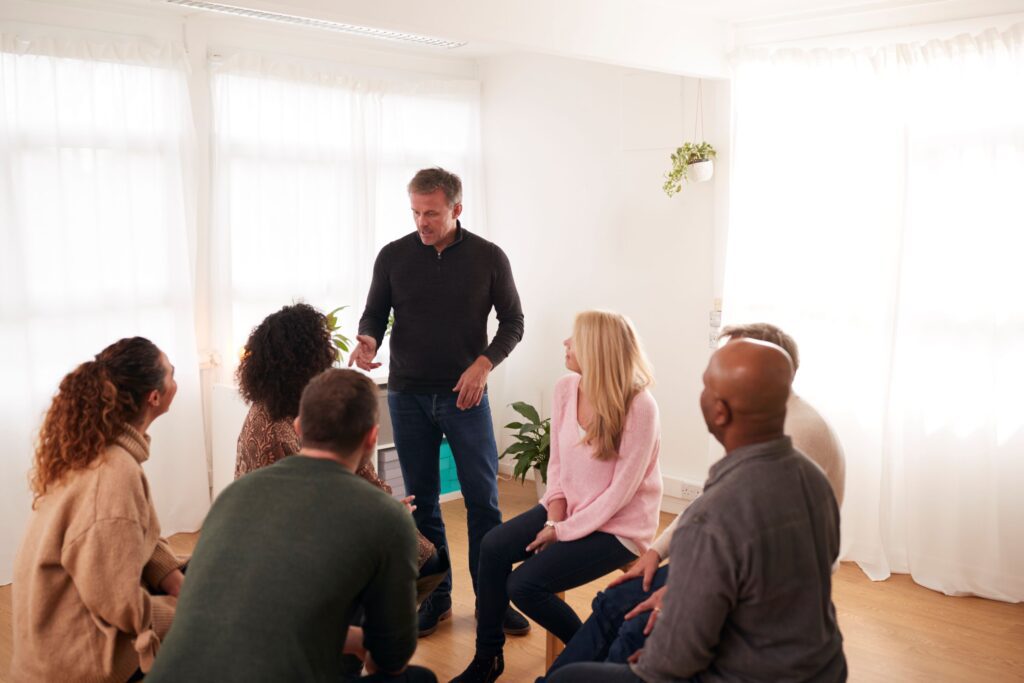Facilitating a psychedelic retreat is not only a deeply rewarding experience but also a significant responsibility. Those who wish to dedicate themselves to this enriching path can have a tremendous impact on the lives of individuals seeking growth, healing, and connection through these transformative experiences.
As a facilitator, you not only create the ideal environment for personal transformation but also provide the essential support and guidance required for navigating the profound journey of self-discovery and healing. At The Buena Vida, we strive to advance human consciousness and empower individuals to lead happier lives by equipping aspiring facilitators with the necessary knowledge, skills, and experiences that will allow them to excel in their role.
Becoming a proficient psychedelic retreat facilitator is a process that demands continuous personal and professional development. The path of a retreat leader is one of dedication, self-awareness, and a deep connection with those you hope to serve. As you embark on this journey, you must be able to cultivate essential skills, foster a strong sense of empathy, and maintain a commitment to your own growth and the growth of others.
In this article, we will explore the foundational aspects of becoming an outstanding psychedelic retreat facilitator. We will delve into key skills and qualities essential to effective facilitators, discuss best practices for creating a safe and supportive container for participants, and examine the roles and responsibilities of a retreat leader during the psychedelic journey and integration process. Our ultimate goal is to provide insight and inspiration for aspiring facilitators who wish to make a meaningful difference in the lives of those they guide through the transformative world of psychedelic retreats.
Cultivating Essential Skills and Qualities
The path to becoming an effective psychedelic retreat facilitator begins by cultivating essential skills and qualities that will enable you to provide the necessary support and guidance for your participants. Let’s explore the key aspects that are fundamental to this role.
Developing Empathy and Compassion
As a retreat facilitator, empathy and compassion are at the heart of your practice. These qualities enable you to form deep connections with participants, ensuring they feel safe, supported, and understood throughout their personal journey. To cultivate these essential traits:
- Engage in active listening, attentively hearing participants’ perspectives and experiences without judgment.
- Practice self-compassion, acknowledging your own emotions and experiences to better relate to those of others.
- Seek to understand the nuances of each participant’s journey, recognizing that every individual’s path is unique.
Building Trust and Establishing Rapport
Establishing trust and building rapport with participants is critical for creating a comfortable, supportive environment that fosters personal growth and healing. To strengthen these connections:
- Maintain open communication, encouraging participants to share their thoughts, concerns, and insights.
- Exhibit consistency and reliability, demonstrating your commitment to participants’ well-being and growth.
- Offer emotional support, validating participants’ experiences and offering reassurance throughout their journey.
Enhancing Self-Awareness and Personal Growth
A key aspect of facilitating a psychedelic retreat is maintaining an ongoing commitment to your self-awareness and personal growth. To enhance these areas:
- Engage in regular self-reflection, evaluating your strengths, areas for improvement, and personal experiences.
- Participate in learning and development opportunities, seeking new knowledge and skillsets to enhance your practice.
- Expand your understanding of the psychedelic experience, exploring different modalities, techniques, and approaches to guiding participants.
Effective Communication and Group Facilitation
As a retreat leader, proficient communication and group facilitation skills are essential for creating a supportive, inclusive environment for participants. To develop these abilities:
- Practice clarity and openness in your verbal and nonverbal communication, ensuring participants understand expectations and feel heard.
- Cultivate a collaborative atmosphere, encouraging participants to share their insights, experiences, and perspectives.
- Foster a safe space for vulnerability, making sure participants feel confident and comfortable expressing their emotions and thoughts.
The Art of Creating a Safe and Supportive Container
Successful psychedelic retreat facilitators understand the importance of creating a safe, comfortable, and nurturing environment for participants – a “container” in which they can explore their inner worlds without fear or apprehension. Here are some essential factors to consider when establishing this container:
- Physical environment: Make sure your retreat space is clean, comfortable, and welcoming, with plenty of natural elements, artwork, and comfortable seating.
- Group norms: Establish clear guidelines and expectations for participant behavior to promote harmony, respect, and open communication.
- Ritual and ceremony: Incorporate sacred rituals and ceremonies to heighten the sense of spiritual connection and reverence for the healing process.
- Skilled assistance: Ensure that you have a well-trained, empathetic, and competent team to support you in tending to participants’ emotional, psychological, and physical needs.
Guiding the Psychedelic Journey and Integration Process
A well-prepared facilitator not only helps to establish the ideal environment in which participants can explore their inner worlds but also provides guidance to help them navigate their psychedelic journey and the subsequent integration process. Here are some key approaches to consider:
- Intention-setting: Encourage participants to set clear, meaningful intentions for their psychedelic experience, fostering greater self-awareness and insight.
- Active support during the journey: Remain present, attentive, and responsive to participants’ needs during the psychedelic experience, offering reassurance, guidance, and support as needed.
- Post-journey integration: Assist participants in processing, understanding, and integrating their experiences, helping them to glean insights and apply newfound wisdom to their daily lives.
Conclusion
Embarking on the path to becoming an outstanding psychedelic retreat facilitator requires dedication, empathy, and a constant commitment to personal and professional growth. By cultivating these essential aspects, aspiring facilitators can make a lasting, positive impact on those they guide through the transformative world of psychedelic retreats.
Embarking on this fulfilling and profound path begins with understanding the essentials of psychedelic facilitator training and immersing yourself in a journey of self-discovery, growth, and unwavering dedication to the service of others. Open yourself to the possibilities of this life-changing role, and join us in the pursuit of advancing human consciousness. Contact The Buena Vida today!


